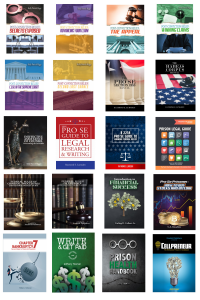Small Gifts Speak Louder Than Words Among the Incarcerated
As most prisoners' families already know, there aren't many comforts from home that you can send to an incarcerated loved one. This is largely due to onerous correspondence restrictions that are in place in virtually every jail and prison in the country. Gone are the days of care packages, clothes packages, Christmas packages from home and even some publications due to them featuring nudity or other adult or violent content. Freebird Publishers (www.freebirdpublishers.com) however, specializes in the few items that can still be sent into almost all prisons around the country.
While many items are prohibited in American jails and prisons, some are still allowed. And it is these items that can make a stay in the slammer that much more bearable and less toxic.
This article presents the five top items that you can send your loved one in prison which will immediately improve their quality of life.
1. Personal Correspondence
One of the great pains of prison is that of being cut off from friends and family alike. The uniformity and impersonality of prison life seems to strip inmates of their very sense of self. In order to combat this, prisoners' families and friends can send letters, notes, cards and photos to help their incarcerated loved ones keep in touch with not only the world outside of prison, but who they are, too. This connection to loved ones in the world outside of prison can be the difference between the prisoner remaining grounded and attached to the outside world or lost to the convict culture.
2. Commissary Money
While not nearly as personally meaningful as a letter or note from a loved one or a friend, most American prisoners are in desperate need of basic food and hygienic items. While the prison does provide three meals a day, a bar of soap, clothes and a bunk to sleep in, these really are the necessities to sustain life. For example, in the Federal Bureau of Prisons, inmates aren't even provided with shampoo, shorts or tennis shoes. While shampoo isn't needed to survive (bar soap cleans hair, too), it is a huge quality of life improvement, this is the same for shorts on a hot day or tennis shoes when trying to work out. Try going a full month on two disposable razors and a hotel-sized bar of soap, and the point becomes clear: even a few dollars a month represents a great leap in a prisoner's standard of living.
Most prisoners make very little money from their prison work details. For example, while I don't do much work, I am paid 12 cents per month as a Recreation Department orderly at FCI Petersburg. Prior to this, I was a compound orderly, where I would show up to work five days a week and pick up trash. For this, I was paid $5.25 per month.
If you can afford it, sending $20 to $40 a month to an incarcerated loved one can very significantly improve their quality of life and ensure that they always have a Ramen noodle soup in their locker when the inevitable hunger hits. By sending a little more (say, an additional $15 to $30 per month), they can afford to place phone calls home, too.
3. Books
Next on the list are books. Prisoners love books. When you think of prison, you probably don't think of prisoners reading in their bunks, but it is true, a good book really does help to pass the time. Since most jails and prisons have restrictions on the type (hardcover or soft cover) and vendor/sender (publisher, distributor or family) of the books, it's usually best to limit individual book orders to five books or less per package, for the books to all be soft cover and for them to come from a vendor such as Amazon, whom most prisons allow books to be sent through. An added plus with Amazon is that they offer very decent prices.
A great way to select books for your incarcerated loved one or friend is to simply go on down the New York Times or USA Today bestseller list and send a few that you find there. Better yet, ask the person you know in prison what types of books that they enjoy, and then make selections from bestseller lists solely within their favorite genre. A good book is a great gift any time of the year.
4. Magazines
Next up the expense ladder are magazines. Prisoners love magazines since they don't require as much effort or time to read as books, provide images which help transport their minds out of the confines of prison and even create built-in positive social situations as they pass the magazines along to friends. In this regard, they even become a currency of sorts, if only a currency of favors.
Prisoners in general love magazines such as Maxim, Men's Health, Muscle & Fitness, Time, Atlantic Monthly, The Economist and any number of specialty publications. Prison Legal News, one such specialty magazine that many prisoners love since it always discusses issues of significance to inmates. Like with books, simply asking a prisoner what his or her interests are can point one in the right direction. As a final note, sending a prisoner a magazine subscription goes a long way toward keeping them connected to the world at large, which they will someday need to re-assimilate into.
5. Newspapers
While a bit more expensive than the rest of the items on this list, a subscription to a daily newspaper is a terrific gift that keeps on giving (every paper is passed along and read until tattered). It provides a tangible connection to the outside world, gets the inmate involved every day at mail call (something which can speak volumes when one is excluded due to no mail being sent) and helps them focus on events outside of prison, not the toxic prison culture. Stick with national papers like USA Today, The Wall Street Journal and the New York Times. Local papers can be good, but they tend to not provide as expansive coverage and can result in additional levels of homesickness and are notoriously late in delivery.




































Comments